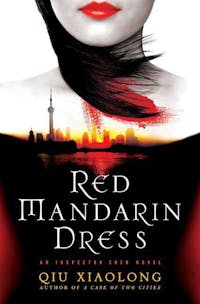Red Mandarin Dress
An Inspector Chen Novel
 Download image
Download image
ISBN10: 031253969X
ISBN13: 9780312539696
Trade Paperback
320 Pages
$21.99
CA$30.99
A serial killer is stalking the young women of Shanghai. The killer's calling card is to leave the victims' bodies in well trafficked locations, each of them redressed in a red mandarin dress. With the newspapers screaming about Shanghai's first serial killer, Party officials anxious for a quick resolution, and the police under pressure from all sides, something has to give.
Chief Inspector Chen Cao of the Shanghai Police Department, a rising party cadre, is often put in charge of politically senstive cases. But this time, there's a catch—Chen is on leave, ostensibly to study for his Master's degree, but also to sidestep being dragged into a messy corruption case with political overtones.
But when the murderer strikes directly at the investigative team itself, Chen must take over the investigation himself discovering that this, his most dangerous and sensitive case to date, has roots that reach back to the country's tumultuous recent past.
Reviews
Praise for Red Mandarin Dress
"[Qui's] lauded series of contemporary Shanghai crime novels . . . feature Chief Inspector Chen Cao. Like Qiu, Chen works as a translator, writes poetry, and maintains an ambiguous relationship with the ruling party. Qiu's debut novel, Death of a Red Heroine, won the prestigious Anthony Award for best first novel by a mystery writer and was ranked as one of the five best political novels of all time by The Wall Street Journal . . . Though ostensibly police procedural dealing with mayhem and malfeasance—albeit laced with classical Chinese poetry and the wisdom of Confucius—the novels' true subjects are Shanghai and the Communist Party. Though in his heart he wishes to be a poet and literary scholar, Chen has been forced into police work by the party. Likewise, Qiu, who was on a similar scholarly path, made an abrupt turn into English-language crime fiction credited in large part to the 1989 Communist crackdown after the Tiananmen Square protests. 'I came to St. Louis and Washington University in 1988 because of T.S. Eliot,' Qiu says. A Ford Foundation exchange scholar, he had already translated The Waste Land, The Love Song of Alfred Prufrock and other Eliot poems into Chinese. Qiu thought that his ongoing work on Eliot might be enriched by coming to the poet's hometown and to the university founded by Eliot's grandfather . . . He made a life in St. Louis with his wife, Wang Lijun, and daughter, Julia Qiu, teaching, translating and earning his doctorate in comparative literature from Washington University in 1995. Meanwhile, life back in China was changing dramatically. With the economy mushrooming and standard of living advancing, Qiu saw that the once-reviled capitalists had morphed into an honored class. He sought to chronicle those changes. 'My first book was meant to be about Chinese culture in this new age,' Qiu says. But as he sought a frame for the novel, he drew on his affection for mysteries and on the true crime stories he had encountered in his previous contacts with a Shanghai magazine. 'I like mystery. Maybe I can use that as a framework, I told myself,' Qiu says. 'It served my organizational purpose. And it is very easy for a cop to move around and ask questions and read documents others cannot.' He styled Chen as 'a thinking cop and an intellectual, not just someone who finds out who did it,' Qiu says, 'but also the cultural and social circumstances surrounding the crime' . . . His Inspector Chen novels give Qiu a way of understanding and accepting the past and present, he says."—Rick Skwiot, Washington Magazine
"Intriguing . . . intelligent . . . poignant."—The New York Times Book Review
"Shanghai is vividly drawn, crackling with energy."—The Economist
"Qiu Xiaolong gracefully illuminates many aspects of modern Chinese culture and society."—
The Denver Post
"The author's heady plot highlights his strenghts, elegantly capturing China in transition. A fascinating read."—Kirkus Reviews (starred review)
"In this fifth entry in an outstanding series . . . author Qiu captures the bustling atmosphere of modern China coming to grips with its Communist roots. Patrons who enjoy mysteries set in today's China, such as those by Peter May, will want this one."—Library Journal (starred review)
"The first-rate characterizations and elegant portrait of a society attempting to move from rigid Maoist ideologies to an accommodation with capitalism will keep readers engaged and eager for more."—Publishers Weekly



